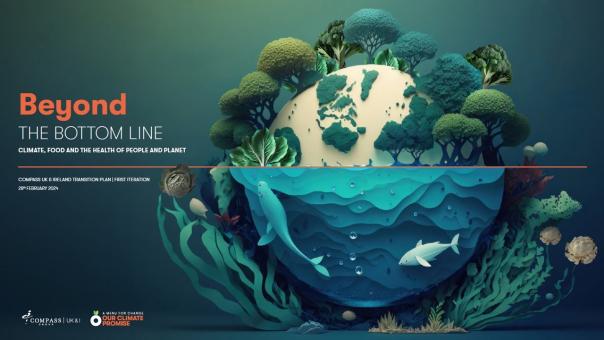
The transition plan shows what it takes to decarbonize a multi-billion pound business, in a period of continued growth for the caterer. The plan draws on the largest food and drink carbon impact assessment undertaken by any foodservice provider to date.
Compass serves 214 million meals a year across 4,000 locations. Food and drink represents 62.5% of the caterer’s FY23 footprint, where the business has achieved a reduction of 162,828 tCO2e of emissions attributed to food and drink purchases.
Other key achievements to date include:
- 25% reduction in carbon intensity
- One in four recipes analysed now rated as ‘low carbon impact’ (A and B rated) as part of a wider project to reduce the footprint of 214 million meals served annually
- 185,000 meals donated to charities in past 12 months, contributing to a total of one million meals redistributed via FareShare since 2014
- Three quarters of a million litres of cooking oil converted into biofuels
- 31 tonnes of cling film saved, which is the equivalent of over 5,200 miles – it could stretch from the UK to USA
- Removed almost 50 million pieces of cutlery, 6.3 million plastic bottles, 1.4 million cans, and 3.9 million sachets
- Recipe reformulation >90% of its recipes now containing low to medium amounts of sugar and salt
Robin Mills, chief executive at Compass Group UK & Ireland, said: “We always knew setting a 2030 target was ambitious, but it has helped to accelerate change in our business and drive positive behaviours as we seek to operate more sustainably in all that we do.
“It’s great to see that the actions we are taking are having an impact. At the outset we said we wanted to be transparent and share our learnings. I am delighted to be publishing our transition plan, which I hope provides great learnings for others to also work with.”
Examples of the impact achievable through Compass’ size, scale and agency are explained in the plan through four core levers of change:
- Supply chain: Compass’ procurement arm Foodbuy is launching a new Net Zero Pipeline for FY24, where category buyers will assess the environmental implications of one product against another.
- Operations: Strong sectorised leadership across 2,900+ partnerships is shown through specific interventions, data-driven action and accountability.
- Ingredients: 25% of 8,004 centrally analysed recipes (one in four) now have A and B rated footprints.
- Culture: Successfully reducing the carbon footprint of its 12 top selling meals in Compass’ business and industry sector has strengthened the alignment of its climate and health strategies, achieving an average saving per portion of 1.39kg CO2e across 209,029 meals sold every year.
Carolyn Ball, director of delivery for net zero at Compass Group UK & Ireland, concluded: “Compass’ opportunity to contribute to society, the economy, and the natural environment we depend on has motivated a growing and talented multi-disciplinary team. Over the coming years there will be developments we can’t foresee or accurately forecast. This means our plan will necessarily evolve over time. We sincerely thank everyone who continues to support us.”